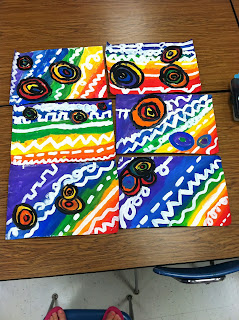 Time for an art teacher confession: I rarely do the exact same project with every class. I have four sections of first grade. The first session used gray paper and shaded it their robots with chalk to add value, which I saw and loved in this lesson from deep space sparkle. I thought they looked great, but the kids were not impressed. They just thought it looked "dusty!" So for my next group, I switched to metallic silver paint. The shiny paint was more fun for the kids, but it didn't give the value I was hoping for. I think the best results were with the group that I had do both. We painted with metallic paint first, then added the chalk value when they were dry. Art is about experimenting and finding what works best!
Time for an art teacher confession: I rarely do the exact same project with every class. I have four sections of first grade. The first session used gray paper and shaded it their robots with chalk to add value, which I saw and loved in this lesson from deep space sparkle. I thought they looked great, but the kids were not impressed. They just thought it looked "dusty!" So for my next group, I switched to metallic silver paint. The shiny paint was more fun for the kids, but it didn't give the value I was hoping for. I think the best results were with the group that I had do both. We painted with metallic paint first, then added the chalk value when they were dry. Art is about experimenting and finding what works best!After our robots were finished, we cut them out and put them on black paper. We used chalk dipped in water to create a space-themed background. The wet chalk technique was the highlight for the students!






























